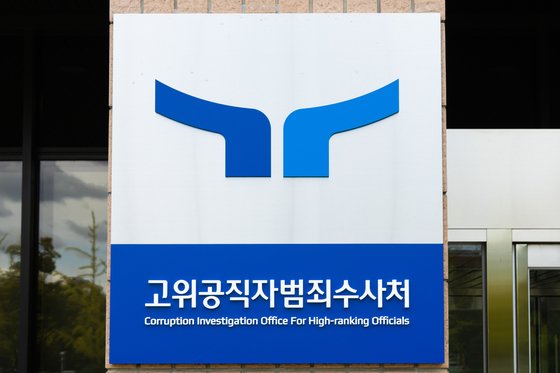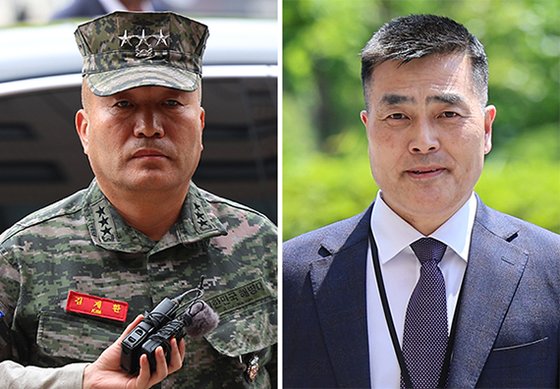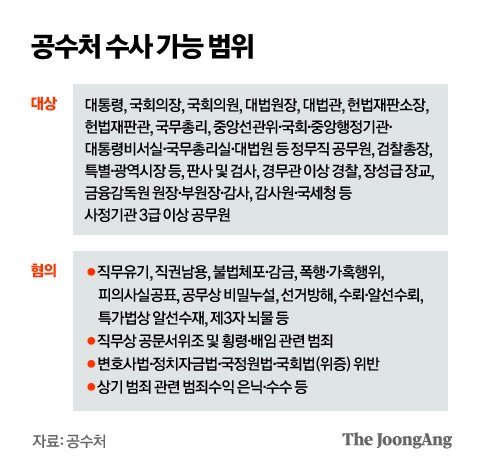At the National Assembly audit of the High-ranking Public Officials Crime Investigation Office (High-ranking Public Officials Crime Investigation Office) held by the Legislation and Judiciary Committee at the National Assembly on the afternoon of the 14th, Director Oh Dong-woon, Deputy Director Lee Jae-seung, and other employees said, “If you think the High-ranking Public Officials Crime Investigation Office should continue, please raise your hand.” Everyone is raising their hands in response to People Power Party lawmaker Kwak Gyu-taek’s remarks. Yonhap News
I have come to the conclusion that abolition is the answer.
This is the ‘uselessness theory’ of the Corruption Investigation Office raised by the People Power Party during the National Assembly Legislation and Judiciary Committee’s audit of the National Assembly’s government affairs on the 14th. Rep. Park Jun-tae said, “While preparing for this government audit, we tried to objectively verify what the Corruption Investigation Office has done, but the conclusion was abolition.” He added, “We received 2,400 cases last year, but no prosecutions were filed.” At this meeting, a question was even asked, “If you think the Corruption Investigation Office should continue, please raise your hand.”
In fact, according to data submitted by People Power Party lawmaker Park Joon-tae from the Corruption Investigation Office earlier this month, the Corruption Investigation Office received a total of 3,303 cases from last year to June 30 of this year and requested only one case to file a direct indictment. There were three cases in which prosecutors were requested to file charges after determining that criminal charges were acceptable. The Corruption Investigation Agency, now in its fourth year since its launch, is shaking due to the low workload and the reappointment of prosecutors from the Corruption Investigation Investigation Office.

A signboard of the High-ranking Public Officials Crime Investigation Office (Corruption Investigation Office) hanging at the Gwacheon General Government Complex in Gwacheon, Gyeonggi-do. photo investigation office
Four prosecutors approved for reappointment two days before their term ends… ‘Opening closure’ barely avoided
On the 25th, President Yoon Seok-yeol approved the reappointment of four prosecutors from the High-ranking Public Officials Crime Investigation Agency (Corruption Investigation Office), two days before their term of office expired. Although the Corruption Investigation Office avoided the worst situation of ‘opening and closing’, it is pointed out that this incident shows that the Corruption Investigation Office is caught in internal and external troubles.
The term of office for prosecutors in the Corruption Investigation Office is three years and can be reappointed three times. According to the Corruption Investigation Office Act, when an application for reappointment is received, the person must be appointed by the President after a majority vote of the Corruption Investigation Office’s Personnel Committee, which includes external members recommended by the ruling party and the opposition party.
Previously, the Personnel Committee of the Corruption Investigation Office unanimously decided in mid-August to reappoint the Corruption Investigation Office’s Investigation Planning Director Cha Jeong-hyeon, Investigation Department 4 Director Lee Dae-hwan, and Investigation Department 3 Prosecutors Song Young-seon and Choi Moon-seon. However, President Yoon, who received the proposal for a second term, delayed reappointment for more than two months and approved a second term on the 25th, two days before the end of his term. Among them, Investigation Planning Director Cha and Director Lee Dae-hwan are the key personnel who have been in charge of investigating the ‘Marine who died in the line of duty’ case.
Han Sang-hee, a professor at Konkuk University Law School, pointed out, “It seems that the president intended to send a message that he ‘does not look favorably’ on the investigation into the case of a Marine who died in the line of duty by the Corruption Investigation Office, while at the same time trying to hinder the smooth investigation.”

Marine Corps Commander Kim Gye-hwan (left photo) and former Marine Corps investigation team leader Park Jeong-hoon are present at the High-ranking Official Crime Investigation Office at the Gwacheon Government Complex in Gwacheon-si, Gyeonggi-do on May 21 to receive an investigation related to the investigation into the case of Corporal Chae. Yonhap News·News 1
Han Sang-woon, a professor at Yonsei University Law School, said, “The status of prosecutors in the Corruption Investigation Office is too weak. The president is also the one who decides on reappointment for a three-year term. “It is difficult to expect a thorough investigation when your status is unstable,” he said, adding, “Situations like the present may be repeated in the future.”
The number of prosecutors is reduced to 15 due to dismissal and retirement… Budget is also cut
Although the reappointment of four prosecutors at the Corruption Investigation Office was decided, the problem of lack of investigative manpower at the Corruption Investigation Office still remains. According to the Corruption Investigation Agency Act, the number of prosecutors is 25, but currently there are only 17. One chief prosecutor will be dismissed from the National Assembly as of the 31st, and one prosecutor whose term is coming to an end will finish his term without reappointment, reducing the number of prosecutors to 15. Accordingly, the Corruption Investigation Office began the process of recruiting 7 new people, including 3 chief prosecutors and 4 rank prosecutors.
Professor Youngsoo Jang said, “The biggest problem of the Corruption Investigation Agency is the human resources issue. “The authority to investigate former and current presidents, high-ranking public officials, and their families is quite large, but the manpower is not in place,” he said. “Even when the prosecution investigates a large case, dozens of prosecutors are deployed.” “Even if the maximum number of prosecutors is 25, there is a shortage of cases being investigated by the Corruption Investigation Office, and manpower is not being expanded,” he said.

Reporter Park Gyeong-min
Meanwhile, the investigation-related budget of the Corruption Investigation Office also turned red. According to the office of Democratic Party of Korea lawmaker Lee Kun-tae, the budget for digital forensics of the Corruption Investigation Agency for next year submitted by the Ministry of Strategy and Finance is 855 million won. In particular, the budget for ‘digital forensic equipment introduction license renewal’ was 541 million won, a decrease of about 40% compared to this year.
Since digital forensics is the basis of investigation by investigative agencies, there are concerns that investigation may be disrupted. The Corruption Investigation Agency says it is waiting for deliberation by the National Assembly, but its position is that if the government’s plan is confirmed, it will be difficult to operate the forensic equipment it currently has.
All-stop investigation into ‘Marine killed in the line of duty’… Other investigations are also underway.
In addition to the lack of manpower, there is also a gap in cooperation with other investigative agencies, and the investigation of major cases conducted by the Corruption Investigation Office is in the process of being delayed. In the case of the Marine who died in the line of duty, where there is even suspicion of presidential involvement, no additional investigation, such as summoning officials or search and seizure, has been conducted since the president’s personal cell phone communication details were secured last August.
It is reported that the momentum for the investigation has been lost as it has become unclear whether key investigative personnel will be approved for reappointment. In addition, the investigation is being delayed as we have not yet received a response to the investigative data on the case of a Marine who died in the line of duty, which was requested from the Gyeongbuk Police Agency in July and August, or the results of the mobile phone forensic work of former Marine Corps 1st Division Commander Lim Seong-geun, which was requested from the National Police Agency.
Under current law, the Corruption Investigation Office can request other investigative agencies, such as prosecutors or police, to submit case data related to high-ranking public official crimes, but there is no way to force it even if other investigative agencies refuse. In fact, the Corruption Investigation Office has not received the decision not to indict luxury bags and the list of records requested from the Seoul Central District Prosecutors’ Office on the 7th for nearly three weeks. An official from the Corruption Investigation Office said, “Once we receive the data, we can review the reasons for non-indictment.”

Prosecution, police, and Corruption Investigation Office logo.
Professor Young-soo Jang explained, “Especially from the perspective of the Corruption Investigation Office, which lacks manpower, if it does not receive cooperation with records from other investigative agencies, there will inevitably be major setbacks in the investigation.” He added, “In the beginning, the Corruption Investigation Office claimed to be the superior agency of the prosecution and police, so the relationship became strained.” did it
Professor Han Sang-hee said, “The top priority in establishing the Corruption Investigation Office was the cooperation system with other investigative agencies, but when the last government launched the Corruption Investigation Office, it was negligent in creating the overall conditions for the Corruption Investigation Office to operate.” He added, “We need to prepare joint guidelines among investigative agencies, etc. “We need to establish a cooperation system,” he said.
Reporter Seok Gyeong-min [email protected]

